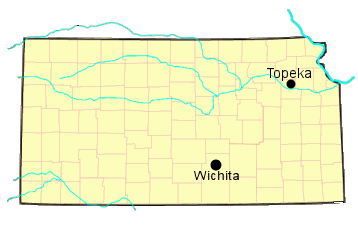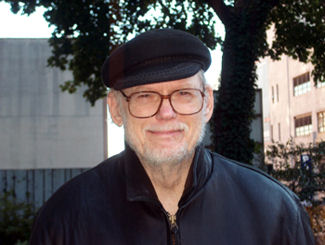| |
James Mechem was born in Wichita in 1923, but raised in Topeka, where his father, Kirke Mechem, was State Historian and editor of publications for the Kansas State Historical Society. After hegraduated from Topeka High School, where he was editor of the school paper, he joined the Army. After that, he went to the University of Iowa to become a writer. There, he met his wife, who had grown up just a block from him, though he did not know her. After their marriage, they left Iowa and went to Oklahoma, where their first son, Chris, was born. When Mechem returned to Wichita, he worked for Boeing as a technical writer for over thirty years. He was also copy editor at the Wichita Eagle, and was technical writer for Beech, as well. During this time, which also saw the birth of four more children, he published small literary magazines: Out of Sight, Collage, Redstart, and Caprice. He also published widely in the journals of his time, from local magazines like Cottonwood, mikrokosmos, and Ark City Review, to Iowa Review, Colorado State Review, Triquarterly, Talisman, and Poetry. After his wife's death in August of 1996, he moved to Manhattan, New York, where he lived until 2008.
James Harlan Mechem died at the age of 93, on December 23, 2016, in Conway Spring, Kansas. His obituary can be found in the Wichita Eagle; James Harlan Mechem obituary.
The following recollection is by Denise Low:
James Mechem was full of surprises. I met him about 1980 at a Kansas Writers Association conference—a wonderful group kept together by Emporia State professor Keith Denniston. Most of the state’s creative writing departments were members, and independent writers were welcome. James was a mainstay of Wichita arts and letters, a bit of a ham, and he participated often.
Imagine a Salina tavern, poorly lit and a smoky haze pooling over the booths. James Mechem stands up to the microphone. He is a solidly built man, so I expected, well, something very male. Instead, he spoke with a tender and raspy voice, just a hint of Ella Fitzgerald. Soft yet distinct enunciation. Smoky—another layer within the bar’s smoky wreaths. The story was slightly erotic, about lesbian lovers. In those days, feminism was newish and gay love was mostly under wraps. Throughout his performance, no one breathed.
After he read, I approached him and asked if he were a gay woman, a not completely ridiculous question in the dim light. But no. He was married, had five kids, worked as a tech writer for airplane companies. He just liked women. He admired his wife tremendously, and when I visited him in New York in 2003, he grieved her death terribly. He championed women writers and artists throughout his time in Wichita. All his co-editors were women. James was a feminist and comfortably open to his own female side.
His fiction is very good—clean sentences, wry tone, and quirky characters who need paradoxically unattainable, slightly bent companionship. James once showed me his résumé of publications, which included the Paris Review and Art and Literature, then edited by John Ashbery, as well as New York novel publications. He also self-published in his own journals—Out of Sight, The Beaters, Collage, Caprice, Redstart, Redstart Plus. James spent a brief time at the University of Iowa, on the G.I. Bill, before transferring to Oklahoma for journalism and an apprenticeship under Foster Harris, a genre western writer. He pursued his own direction, not a career.
Unlike his beat-era peers—Michael McClure, Charles Plymell, and Bob Branaman—James stayed in Wichita, and that changed his writing life, especially in those days. My experience of the writing world is one where geography makes a huge difference, more than talent. If James had been in San Francisco, his companions would have been writer-household names. His own writing would be better known. His talent was top-notch, as well as his craft as a writer, and he liked to design. So he added publisher to his roles.
James contributed much to the Wichita and regional scene. In that Salina reading, he made a writer’s vocation accessible—no need to kowtow to him as a Great One. Despite my shy nature, I felt no hesitation about starting a conversation. He made the writer’s role seem a bit glamorous. After our first meeting, he continued to encourage me through his editorial comments—I have a bulging file of his rejections and a few acceptance letters, in ornate lavender script. I treasure his nomination of one of my short stories for a Pushcart Prize.
James also sponsored readings. One of my favorite stories is James’s barrage of letters to convince me to attend a reading at Wichita State, one of the creative writing program anniversaries, and I have an MFA from WSU. He had no money, but he promised me dinner and a good single-malt scotch. So I slipped out of work early, sped down the Turnpike, and had a pleasant meal with him and a shot of Glenmorangie. Then we went to the reading, two sessions, and I got put into the second session. Someone before me had an emotional meltdown during her reading, weeping about how important it was for her to return to Wichita, and she took an hour. By the time I read, heading towards midnight, about six dazed people were left in the audience. It was one of those classic road-reading stories. James was upbeat the whole time, happy with the entire adventure, indefatigable.
My trip to New York in 2003 to see James was crazy. He sent me a ticket and said I could stay in the apartment next to his. I flew in, got a taxi, and gave the address to the cabbie. In the sea of vertical buildings, I was helpless. The maniac drove through tunnels and around Central Park, up a circle drive, and screeched to a stop. A liveried door man came to ease me back to safe landing. It was a posh apartment building, gardens around it, marble lobby, the works. The security manager had my name on the list, and he smirked just a bit. I felt like I had landed inside one of James’s stories.
We spent time talking, traveling around the city to art shows, eating at diners, and finally we went to the Bowery Poetry Club to read. We met up with Ruby Baresch, who wrote film reviews for Caprice. We spent the last evening doing a long interview, which is available online at “Beats in Kansas,” a site maintained by George Laughead. James loved having company, as New York was lonely. He moved there in 1998, because he loved Book Expo and wanted to spend more time in the city, he said. He appreciated the public transportation and literary events, but most of his friends and family were back home in the Wichita area.
One more story—I ended up on the living room couch. James said, as I was getting ready for bed, “Don’t mind if I sleep walk. I don’t remember a thing the next day.” That was enough to keep me awake until about 3 in the morning. About 4, indeed, his door opened and he staggered toward the kitchen. Somewhere in the cabinets he found a bottle of coconut or tangerine liqueur (it was left open in the morning), had a slug, and went back to bed. I fell asleep to the fumes of perfume-sweet alcohol. Indeed, in the morning he had no memory of his excursion. He brewed coffee, and a new day began.
James is an original. He is also an inspiration for those of us under ninety. He dedicated his life to literary community. He made Wichita an exciting wonderland of ideas, genders, journals, characters, and more. As an editor, he mentored numerous people. He was nice and not domineering, dismissive, nor seductive to women at a time when few professional men of his generation had that ability. I am grateful to James for all he has contributed, for his eccentricities, for his writings, and for the fellowship of Ancient Mariner Press writers.
©Denise Low, September 13, 2013, Anna Murdoc’s Café, Wichita.
More biographical information appears in the Denise Low interview of James Mechem below.
Return to Top of Page
|
|
|

![]() Return to Wichita
Return to Wichita![]() Return to KANSAS MAP
Return to KANSAS MAP


